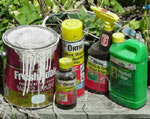Household Hazardous Waste
Proper management of household hazardous waste (HHW) is an integral part of protecting land, air, and water systems. Household products that contain hazardous components can have adverse effects on the environment and require special awareness, handling, and disposal.
-
What Qualifies as HHW?

- poisons
- motor oils
- flammable liquids
- antifreeze
- corrosives
- paint products
- automobile fluids
- fluorescent lamps
- batteries
-
Proper Storage of HHW
The proper storage of HHW is just as important as its proper disposal. Follow these tips for safe storage:
- Check all containers for leaks or rust holes
- Do not mix different or unknown materials together
- Label all containers
- Store materials in a secure place out of the reach of children, and away from rain and heat
- Handle all materials carefully to minimize the risk of exposure
- If a leak occurs, clean up spills with an oil-absorbent material (such as cat litter)
- Buy only the necessary quantity of products
-
The Power of Vinegar
Vinegar can be used as a simple, safe, non-toxic cleaner for windows, floors, and furniture. For more information, see this list of alternative household cleaning products.



